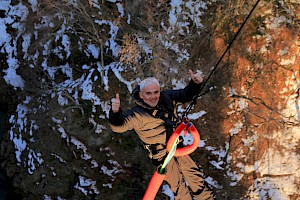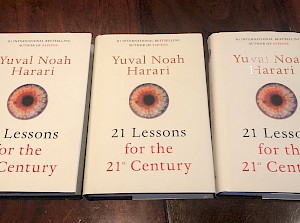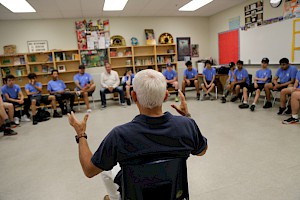There is no better day than Christmas to pause and reflect and hope for humanity
December 23, 2022Originally published in The Toronto Star on December 20, 2022 as a contributing columnist.
“We are all visitors to this time, this place. We are just passing through. Our purpose here is to observe, to learn, to grow, to love … and then we return home.”
— Aboriginal proverb quoted by Queen Elizabeth II in 2011
We are all familiar with the meaning of Christmas. It is a time for compassion and kindness when we endeavour to spread peace towards our fellow humans. The fact that it takes place on only one day out of 365 should be evidence enough that we most certainly fall short the rest of the year.
The first Christmas ever was celebrated on Dec. 25, 336 AD. A date chosen by Roman emperor Constantine, the first emperor to become a Christian, mostly as a political move to placate the fast-growing Christian population in his domain.
Christians had been persecuted for the previous two centuries under imperialist Roman rule. To shore up its importance, Constantine chose the 25th of December in order to absorb the traditions of the pagan Saturnalia festival. Many of our Christmas traditions, including gift exchange, singing, and the decoration of trees were borrowed from the festival celebrating the Roman God, Saturn.
Constantine’s chosen date continued to play a role in the making and breaking of empires throughout history.
On Christmas Day in 800 AD, Pope Leo III crowned the third Frankish King Charlemagne “Emperor of the Romans,” thus reviving the title about 300 years after the fall of the ancient Western Roman Empire. The Holy Roman Empire would last almost 1,000 years until 1806.
Also on Christmas Day 1066, William the Bastard or Conqueror (your choice) was crowned King of England, a country that would eventually transition into an empire on whose domain the “sun would never set.”
Centuries later on Christmas Day 1991, the last president of the USSR, Mikhail Gorbachev, resigned from his post. The very next day, the Soviet Union was officially dissolved, bringing an end to the last empire of the 20th century. Also of note, on Dec. 25, 1776, George Washington led his 2,400 men across the Delaware River, defeating a British-led garrison. This single raid lifted the morale and momentum of Washington’s colonial forces after having suffered a series of defeats. With the tide of war in their favour, the new Americans eventually won, allowing for the birth of a republic that would one day become the most powerful nation in the world.
Empires come and go. No empire lives forever. Historians have counted approximately 70 empires throughout recorded history, some that lasted many centuries and others that were easily forgotten. The Sumer empire of Mesopotamia lasted more than 2,000 years, before it was defeated by the Babylonians, who in turn created an empire of their own. The shortest “empire” in history was The First Empire of Haiti in 1804, when governor-general Jean-Jacques Dessalines was proclaimed emperor by the generals of the Haitian Revolution Army. He was ingloriously assassinated by his own collaborators only two years later, which led to the country splitting in two.
Empires serve no particular purpose. They are solely the product of man’s ambition, and they reveal a few unflattering characteristics of the human condition, including greed and the aspiration for power. The honour of empire-building goes primarily to the ambitious and ruthless. More importantly, they must also be clever enough to convince others to lay down their lives for the cause. As Reverend William Paley put it, “human society is like a flock, where one pigeon — usually the weakest and worst of the bunch — sits back while the rest bring him the bulk of their gathered corn with no payments in return.”
One of the methods by which otherwise good and decent people are manipulated to put their own lives at risk or to kill other good and decent people is to convince them that the “others” are an existential threat to their very survival or way of life. However, the most effective method deployed by leaders throughout history, and to this very day, has been to offer subjects the keys to heaven. There is no limit to what mayhem and bloodshed humans will inflict on one another in the name of God.
The Crusades, a series of religious wars between Christians and Muslims between 1096 and 1291, resulted in some of history’s worst carnage, all in the name of Jesus who as far as I can tell, only taught compassion, sympathy, and love. Of course, both sides fought with absolute confidence that God was solely on their side, woefully unaware that they were both praying to the same God.
An example of the madness of the religious fervour took place following Pope Urban II’s call to arms which set the first crusade into motion. The Christian faithful were whipped into such a frenzy that ordinary citizens mobilized into killing machines. In one case, a group of German peasants journeyed to Jerusalem following a goose (yes, a goose) they believed had been inspired by the Holy Ghost. Temporarily forgetting their intended enemies were the Muslims, they mercilessly slaughtered all the Jews they encountered along the way.
As proof that human behaviour is inscrutable, there are also examples of man’s behaviour which is in stark contrast to that of the aforementioned goose worshippers.
One of the most famous examples of kindness, humanity, and peace occurred during a time of devastating bloodshed. The First World War was a bloody and miserable affair that claimed 20 million lives. But on Christmas Day 1914, amongst all the mud, bullets, shells, and blood came a moment that gave many hope that humanity could survive.
Much to the dismay of their commanding officers, British, French, and German troops spontaneously put down their arms and met in the no man’s land between trenches to exchange gifts and sing songs together. Although this unofficial Christmas truce would last just a few hours before all sides resumed fighting, its message did offer hope for humanity during the darkest of times.
Human behaviour is a paradox for sure and the rise and fall of empires, wars and hatred will likely continue until we drive ourselves to extinction. If only we could step back and see ourselves for the truly smaller part that we represent in a much bigger picture, we would come to realize how ridiculous we are.
American astronomer Carl Sagan’s, “The Pale Blue Dot” puts it all into perspective:
“The Earth is a very small stage in a vast cosmic arena. Think of the rivers of blood spilled by all those generals and emperors so that in glory and triumph they could become the momentary masters of a fraction of a dot. Think of the endless cruelties visited by the inhabitants of one corner of this pixel on the scarcely distinguishable inhabitants of some other corner.
“How frequent their misunderstandings, how eager they are to kill one another, how fervent their hatreds. Our posturings, our imagined self-importance, the delusion that we have some privileged position in the universe, are challenged by this point of pale light. Our planet is a lonely speck in the great enveloping cosmic dark. In our obscurity — in all this vastness — there is no hint that help will come from elsewhere to save us from ourselves.”
In the end, only we can save us from ourselves.
There is no better day than Christmas to pause and reflect and hope.
Merry Christmas.










